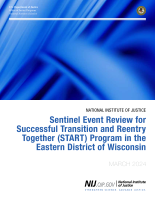Sentinel Events Initiative
Sentinel event reviews: Applications in criminal justice settings
Sentinel Events Initiative: A Compiled Bibliography
Expanding Research to Examine the Impacts of Forensic Science on the Criminal Justice System
In 2004, the National Institute of Justice created the social science research on forensic sciences (SSRFS) research program to explore the impact of forensic sciences on the criminal justice system and the administration of justice. Much of the early research from the SSRFS program focused on DNA processing and the use of DNA in investigations and prosecutions.
See the YouTube Terms of Service and Google Privacy Policy
Case Deconstruction of Criminal Investigative Failures
NIJ Journal Issue No. 273
"Sentinel Event" Review in the Criminal Justice System
Listen to James Doyle discuss the basics of a "sentinel event" review in the criminal justice system. This learning-from-error approach borrows from principles that medicine, aviation and other high-risk enterprises have successfully used. Former NIJ Fellow Doyle offers the basics to understand this innovative idea that takes a system-wide perspective of error, bringing all stakeholders together in a non-blaming, forward-looking way after a bad outcome, such as a wrongful conviction, occurs.
NIJ Strategic Research and Implementation Plan: Sentinel Events Initiative (2016-2021)
Research Meetings and Workshops
NIJ learns from the people who work day-to-day with the issues. We sponsor meetings, workshops, and working groups that bring together researchers, policymakers, technologists, and practitioners.
These meetings generate a rich exchange of ideas. They guide future research and help ensure that NIJ's research, development and evaluation activities meet real-world needs.
Review the summaries or transcripts available for many of these meetings:



